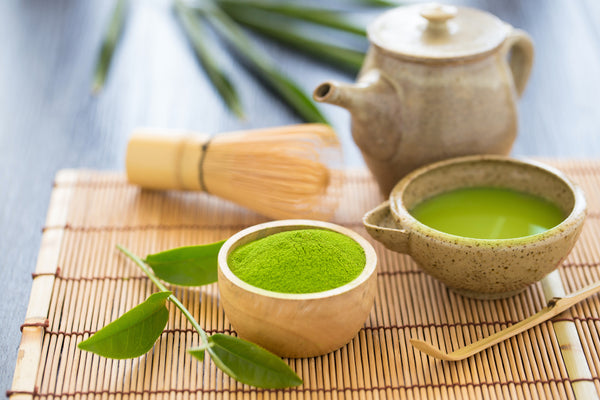With its potent anti-inflammatory properties, amino acids, and extensive nutrients, matcha makes for an excellent choice for women with polycystic ovarian syndrome. Polycystic ovarian syndrome, or PCOS for short, is a complicated hormonal condition that can be frustrating to manage. While PCOS, unfortunately, cannot be cured, there are ways to reduce symptoms and allow women who have PCOS to live a mostly normal life. Research shows that one of the most important ways to manage PCOS is by having a healthy lifestyle and diet, which can include drinking matcha!
Learn more about how matcha can improve hormone health
What is PCOS
PCOS is an endocrine (hormonal) condition that can lead to the growth of multiple ovarian cysts, irregular periods, difficulty getting pregnant, weight gain, insulin resistance, abnormal hair growth, and systemic inflammation, among other symptoms. PCOS develops during the reproductive years in people assigned female at birth. The exact cause of PCOS is unknown, and symptoms can vary from person to person. While early diagnosis and treatment can make all the difference, sadly, it’s a condition that often goes undiagnosed for far too long.  In people with PCOS, the ovaries produce abnormal amounts of androgens, a male sex hormone that females usually have in small amounts. PCOS is also thought to have a genetic component. So, if you have a sister or mother with it, you’re more likely to have it as well.
In people with PCOS, the ovaries produce abnormal amounts of androgens, a male sex hormone that females usually have in small amounts. PCOS is also thought to have a genetic component. So, if you have a sister or mother with it, you’re more likely to have it as well.
Symptoms:
-
Male pattern baldness or thinning hair
-
Missed or irregular periods
-
Excess body hair
-
Acne or oily skin
-
Infertility
-
Large ovaries or many cysts on the ovaries
-
Weight gain
What is Matcha
Matcha is a type of green tea that is ground into a very fine powder. Unlike loose-leaf green tea, matcha is shade-grown the last few weeks before harvest. The whole tea leaf is then used to produce the bright green, earthy powder. Because of its growing and harvesting methods, matcha has a high content of antioxidants and L-theanine.
Learn more about how to identify high-quality matcha
Matcha is unique in taste and appearance. It has a bright, vibrant green color and a rich, umami taste. It’s also quite unique in its health benefits. Matcha contains an amino acid called L-theanine, which alters the effects of caffeine and gives you a relaxed yet alert feeling. It’s a jitter-free energy source! Research shows that L-theanine can help foster deep relaxation and may reduce anxiety.
Matcha is also a concentrated source of antioxidants and contains 10x the amount found in a traditional cup of green tea. Antioxidants may help fight the damage of free radicals and are especially important for those with PCOS.
Keep reading to find out the five reasons matcha is beneficial for women with PCOS.
Why Drink Matcha
1. Improves insulin sensitivity
It’s thought that 30-40% of women with PCOS develop insulin resistance. Some medical professionals even go so far as to say that all women with the condition should be treated for insulin resistance. With insulin resistance, the body will still produce insulin, but it isn’t able to use it effectively. This increases the risk of developing type II diabetes. More than half of women with PCOS will develop type II diabetes by the age of 40.
Studies suggest that green tea extract is effective at reducing insulin resistance and improving glycemic control. The natural sugars in green tea may also be able to help combat insulin spikes, which can, in turn, stabilize blood sugar levels. One notable meta-analysis showed that three or more cups of green tea daily was linked to a lower risk of diabetes. The EGCG in matcha may also have a positive impact on insulin function and might help cells become more responsive to insulin.
How matcha can help manage diabetes
2. Aids in weight loss
While the connection between PCOS and weight is poorly understood, being overweight (and having unwanted weight gain) is associated with the condition. Being overweight can also increase your risk for type II diabetes. Something women with PCOS are already at risk of developing.
Several studies show that matcha green tea may help increase metabolism and fat burning. Belly fat, which is particularly common in PCOS, may also be especially targeted by drinking matcha.
3. Reduces inflammation
Chronic systemic inflammation has been linked to PCOS. Having low-grade inflammation can also put you at risk for several other health complications so it’s important to treat/manage if possible.
Matcha contains powerful anti-inflammatory properties. EGCG, which matcha is especially rich in, is an antioxidant that may be able to help regulate inflammation. Antioxidants work to protect cells from free radicals, which can lower inflammation and prevent some diseases often linked to inflammation.
4. Improves heart health 
Women with PCOS are at a higher risk for developing heart disease and having high LDL (“bad” cholesterol) and low HDL (“good” cholesterol). In fact, some studies show that by having PCOS, you are twice as likely to have a cardiovascular event such as a heart attack or stroke.
Studies show that matcha green tea can protect against heart disease and lower cardiovascular risk. It’s suggested that matcha may lower atherosclerosis (hardening of your arteries) and reduce high blood pressure and heart disease overall.
5. Increases immunity
Due to hormone imbalances, women with PCOS tend to have reduced immunity. One study showed that women with PCOS had a 64% decline in a type of cell that is responsible for regulating adaptive (acquired) immunity. This may lead to a weakened immune response.
Matcha may help improve the immune system, and the catechin ECGC can help fight and protect the body from invading bacteria and viral infections. EGCG also helps the body produce T-cells, which are important for fighting pathogens and reducing inflammation.
Bottom Line
PCOS is a complicated hormonal condition that puts women at risk for lowered immunity, insulin resistance, heart disease, and other diseases. While it’s important to adopt a healthy lifestyle and follow the guidance of your medical team, incorporating matcha into your daily routine may be one way to help combat some of these risks. Matcha can help aid in weight loss, improve insulin resistance, increase immunity, and improve heart health.
Disclaimer: These statements in this blog post have not been evaluated by the Food and Drug Administration. The information provided here is for educational purposes only and should not be considered medical advice. It's essential to consult with a qualified healthcare professional before making any dietary or lifestyle changes.
References:
Aboeldalyl S, James C, Seyam E, Ibrahim EM, Shawki HE, Amer S. The Role of Chronic Inflammation in Polycystic Ovarian Syndrome-A Systematic Review and Meta-Analysis. Int J Mol Sci. 2021 Mar 8;22(5):2734. doi: 10.3390/ijms22052734. PMID: 33800490; PMCID: PMC7962967.
Cong Hu, Bo Pang, Zhanchuan Ma, Huanfa Yi, "Immunophenotypic Profiles in Polycystic Ovary Syndrome", Mediators of Inflammation, vol. 2020, Article ID 5894768, 10 pages, 2020. https://doi.org/10.1155/2020/5894768
Kochman J, Jakubczyk K, Antoniewicz J, Mruk H, Janda K. Health Benefits and Chemical Composition of Matcha Green Tea: A Review. Molecules. 2020 Dec 27;26(1):85. doi: 10.3390/molecules26010085. PMID: 33375458; PMCID: PMC7796401.
Purwar A, Nagpure S. Insulin Resistance in Polycystic Ovarian Syndrome. Cureus. 2022 Oct 16;14(10):e30351. doi: 10.7759/cureus.30351. PMID: 36407241; PMCID: PMC9665922.
Scicchitano P, Dentamaro I, Carbonara R, Bulzis G, Dachille A, Caputo P, Riccardi R, Locorotondo M, Mandurino C, Matteo Ciccone M. Cardiovascular Risk in Women With PCOS. Int J Endocrinol Metab. 2012 Fall;10(4):611-8. doi: 10.5812/ijem.4020. Epub 2012 Sep 30. PMID: 23843832; PMCID: PMC3693634.
Wang J, Yin T, Liu S. Dysregulation of immune response in PCOS organ system. Front Immunol. 2023 May 5;14:1169232. doi: 10.3389/fimmu.2023.1169232. PMID: 37215125; PMCID: PMC10196194.
Wang S, Li Z, Ma Y, Liu Y, Lin CC, Li S, Zhan J, Ho CT. Immunomodulatory Effects of Green Tea Polyphenols. Molecules. 2021 Jun 20;26(12):3755. doi: 10.3390/molecules26123755. PMID: 34203004; PMCID: PMC8234133.
Yu J, Song P, Perry R, Penfold C, Cooper AR. The Effectiveness of Green Tea or Green Tea Extract on Insulin Resistance and Glycemic Control in Type 2 Diabetes Mellitus: A Meta-Analysis. Diabetes Metab J. 2017 Aug;41(4):251-262. doi: 10.4093/dmj.2017.41.4.251. PMID: 28868822; PMCID: PMC5583402.







